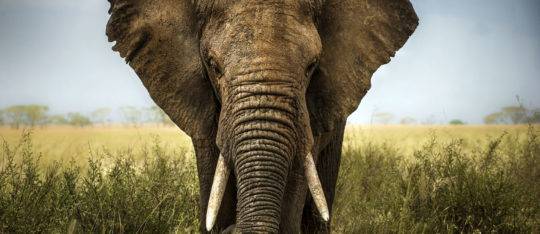Munich, 18th January 2024. – Although the global biodiversity crisis is accelerating, it is still legal to hunt endangered and internationally protected species, including elephants, rhinos, leopards, lions and polar bears, for trophies. In the lead-up to Europe’s biggest hunting fair, which will take place from 30th January to 4th February in Dortmund, Germany, and at which such hunts will be widely promoted and sold, 31 NGOs from across Europe and Africa scrutinise and scientifically debunk the myths promoted by trophy hunters in a hard-hitting report. “Trophy hunting harms many and benefits very few. The hunting lobby tries to greenwash their cruel practice and create a smokescreen. But in the final analysis, trophy hunting is neither scientifically nor ethically justifiable and we as a society should follow the facts and stand by our values”, summarises Dr Mona Schweizer, biologist and trophy hunting expert at Pro Wildlife.
Trophy hunting compromises conservation
One of the hunting industry’s key narratives is that trophy hunting helps to conserve species by protecting land for wildlife and generating income for conservation, and as such is often framed as ‘conservation hunting’. Yet, scientific studies document that trophy hunting negatively impacts populations of endangered and protected species. Trophy hunters have imported 184,429 trophies from internationally protected species in the last decade (2011-2020). By targeting the most impressive individuals of a population, trophy hunters kill the key individuals that disproportionally contribute to reproduction and the gene pool of a population jeopardising its long-term survival. Furthermore, trophy hunting harms species conservation efforts because it normalises killing of animals for personal pleasure. Iris Ho, Head of Campaigns and Policy of Pan African Sanctuary Alliance says, “Using primates as an example which are among the most trophy hunted animals and used in ‘target practice’ by trophy hunters. The wanton killing of primates by foreign trophy hunters undermines local organisations’ community-led conservation and engagement efforts, especially those oriented towards the young generation, in promoting harmonious coexistence with wild animals.”
Few benefits for local communities
Hunting proponents claim that trophy hunting is strictly regulated and that income derived from trophy hunting benefits local communities. However, the report documents that the trophy hunting sector is plagued with corruption, mismanagement and a lack of control. Quotas are rarely based on reliable scientific data, and are typically designed or found to be abused to maximise profits. The main beneficiaries of hunting revenues are hunting outfitters, officials or government entities managing hunting, and foreign hunting tour operators. On average, local communities benefit by as little as USD 0.30 and USD 5.90 per capita per year, depending on the country. “For most communities, trophy hunting is a lose-lose situation. They lose their wildlife to the rifle of foreign hunters, and fail to profit from the money produced by this deadly business. Trophy hunting not only exploits wildlife and nature, but also robs local communities of their heritage and future existence”, states Nick Clark, Eurogroup for Animals.
Increasing opposition to trophy hunting
Social and political opposition to trophy hunting continues to grow. A joint position paper calling for an end to trophy hunting was signed by almost 180 NGOs from around the world. While the hunting sector vigorously lobbies against stricter regulations, the European Parliament has called for an import ban on trophies from protected species, and an increasing number of European countries (including the Netherlands, France, Belgium and Finland) have already implemented or are in the process of implementing hunting trophy import restrictions. Polls have repeatedly shown that a majority of EU citizens (81 per cent across five major European trophy importing countries) oppose trophy hunting and support a ban on trophy imports. “Trophy hunting is a cruel throwback to a colonial past. The targeting of particular animals, usually those with the most impressive traits such as the biggest tusks or the darkest manes, disrupts animal societies and has knock-on effects for populations and ecosystems that we are only just beginning to understand. It’s time this egregious activity was brought to an end. The EU should ban the import of hunting trophies, encourage and reward investment in protecting wildlife, and focus on the benefits that can accrue to local communities through its non-consumptive and ecologically sustainable use,” says Dr Mark Jones, Head of Policy at Born Free.
